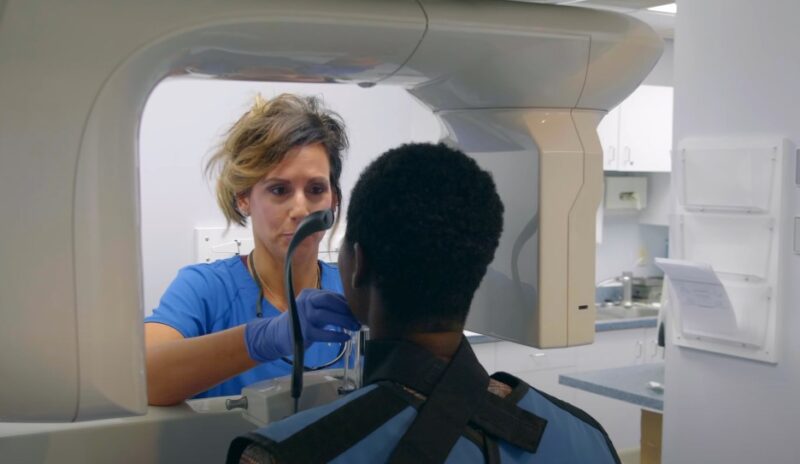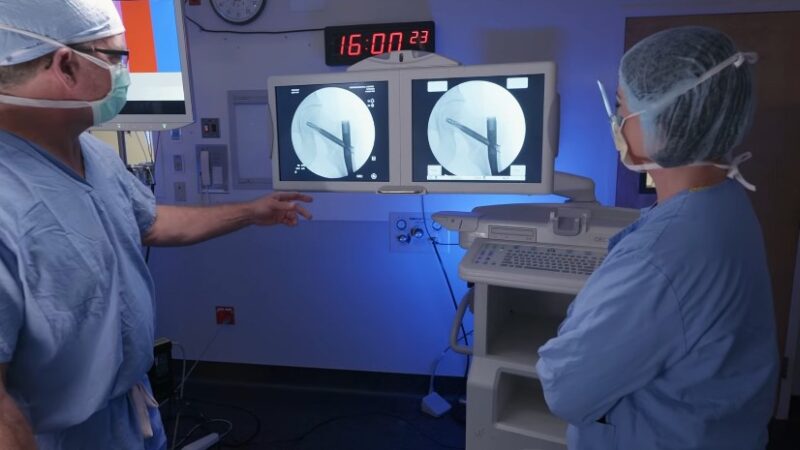Healthcare offers many careers with high earning potential and strong job security. From doctors and nurses to specialists in medical imaging and therapy, many paths provide excellent salaries and opportunities for growth. The high demand for healthcare workers makes this field a great choice for those looking for stable and rewarding work.
The Doctor of Nursing Practice (DNP) is now considered by some as the entry-level degree for advanced nursing. Click here to learn more about this possibility.
This article explores top healthcare careers with high salaries, expected job growth, and the education needed to succeed.
Pediatric Surgeon

| Category | Information |
| Average Salary | $449,320 |
| Education Requirement | Medical degree, 5-7 years residency, 2-year pediatric surgery fellowship |
| Job Growth | High demand due to specialized skills and limited professionals |
Pediatric surgeons perform complex surgical procedures on infants, children, and adolescents. Their work focuses on correcting congenital disabilities, treating trauma injuries, and performing life-saving surgeries. Due to the delicate nature of their patients, pediatric surgeons must have exceptional precision and strong communication skills when working with families.
The career path requires extensive education and training, including medical school, general surgery residency, and a pediatric surgery fellowship.
Cardiologist
| Category | Information |
| Average Salary | $423,250 |
| Education Requirement | Medical degree, 3-year internal medicine residency, 3-5 year cardiology fellowship |
| Job Growth | Strong growth due to increasing cardiovascular diseases |
Cardiologists diagnose and treat conditions related to the heart and blood vessels. Their work includes performing diagnostic tests, recommending treatment plans, and conducting procedures such as angioplasties and pacemaker installations. Due to the rise in cardiovascular diseases, cardiologists remain in high demand.
Extensive education and hands-on experience are required to enter this field, including medical school, a residency in internal medicine, and a specialized fellowship in cardiology. Cardiologists work in hospitals, clinics, and private practices, providing life-saving care to patients with heart conditions.
Radiologist

| Category | Information |
| Average Salary | $353,960 |
| Education Requirement | Medical degree, 5-year radiology residency, optional sub-specialization fellowship |
| Job Growth | High demand due to advancements in imaging technology |
Radiologists specialize in medical imaging, using X-rays, MRIs, CT scans, and ultrasounds to diagnose diseases and injuries. They work closely with other healthcare professionals to interpret imaging results and guide treatment plans. Their role is critical in detecting conditions such as cancer, fractures, and internal injuries.
Radiologists complete medical school, followed by a residency in diagnostic radiology. Some choose to further specialize in interventional radiology or neuroradiology. With increasing reliance on advanced imaging technologies, radiologists remain an essential part of modern healthcare.
General/Orthopedic Surgeon
| Category | Information |
| Average Salary | $348,890 |
| Education Requirement | Medical degree, 5-7 years of residency, optional 1-3 year fellowship for specialization |
| Job Growth | Strong demand, especially in orthopedic and trauma surgery |
General surgeons perform a wide range of surgical procedures, including emergency and elective surgeries. Orthopedic surgeons specialize in conditions related to bones, joints, ligaments, and muscles, often treating fractures, arthritis, and sports injuries.
Both require extensive training, starting with medical school, followed by a long residency in general or orthopedic surgery. Many orthopedic surgeons pursue additional fellowships to specialize in fields such as sports medicine or spinal surgery. These professionals work in hospitals, trauma centers, and specialized surgical clinics.
Dermatologist

| Category | Information |
| Average Salary | $342,860 |
| Education Requirement | Medical degree, 4-year dermatology residency |
| Job Growth | Growing demand due to increased awareness of skin health |
Dermatologists diagnose and treat conditions related to the skin, hair, and nails. They address issues such as acne, eczema, skin cancer, and cosmetic concerns. Some perform surgical procedures, including mole removals and laser treatments.
Medical school and a specialized residency in dermatology are required for this profession. Demand for dermatologists continues to grow as more people seek medical and cosmetic treatments for skin-related conditions. Many work in private practices, hospitals, or specialized skincare clinics.
Anesthesiologist
| Category | Information |
| Average Salary | $339,470 |
| Education Requirement | Medical degree, 4-year anesthesiology residency |
| Job Growth | High demand due to the increasing number of surgeries |
Anesthesiologists manage pain relief and sedation for patients undergoing surgery. They play a crucial role in ensuring patient safety before, during, and after medical procedures by monitoring vital signs and adjusting anesthesia levels.
After completing medical school, anesthesiologists undergo residency training in anesthesia techniques and pain management.
Oral & Maxillofacial Surgeon

| Category | Information |
| Average Salary | $334,310 |
| Education Requirement | Dental degree (DDS/DMD), 4-6 years of surgical residency |
| Job Growth | High demand due to specialization in complex facial surgeries |
Oral and maxillofacial surgeons specialize in surgeries involving the face, mouth, and jaw. Their procedures include wisdom tooth removal, jaw realignment, and reconstructive facial surgeries following trauma or disease.
These professionals first complete a dental degree before entering a surgical residency program. Many also obtain medical degrees to expand their expertise. They work in hospitals, dental clinics, and private surgical practices, often collaborating with dentists and orthodontists.
Ophthalmologist
| Category | Information |
| Average Salary | $312,120 |
| Education Requirement | Medical degree, 4-year ophthalmology residency |
| Job Growth | Steady demand due to aging population and eye health needs |
Ophthalmologists are doctors who treat eye diseases, perform eye surgeries, and help people with vision problems. They diagnose conditions like cataracts, glaucoma, and retinal diseases. Some perform laser eye surgery or prescribe treatments to prevent vision loss.
After medical school, they complete a residency focused on eye care. Many work in hospitals, private clinics, or research settings. As more people face vision problems with age, the need for ophthalmologists remains strong.
Emergency Medicine Physician
| Category | Information |
| Average Salary | $306,640 |
| Education Requirement | Medical degree, 3-4 year emergency medicine residency |
| Job Growth | High demand as emergency rooms remain essential for urgent care |
Emergency medicine doctors treat people who come to the hospital with life-threatening conditions. They handle everything from heart attacks and strokes to serious injuries and infections. They work in high-pressure environments where fast decisions save lives.
These doctors complete medical school and specialized training in emergency medicine. They work in hospital emergency rooms or urgent care centers, providing critical care around the clock.
Obstetrician & Gynecologist (OB-GYN)
| Category | Information |
| Average Salary | $278,660 |
| Education Requirement | Medical degree, 4-year OB-GYN residency |
| Job Growth | Steady demand for reproductive health and maternity care |
OB-GYNs specialize in women’s health, pregnancy, and childbirth. They provide care for expecting mothers, perform surgeries like C-sections, and treat reproductive health issues. Many also offer preventive care, such as cancer screenings and hormone therapy.
They work in hospitals, clinics, or private practices, helping women through all stages of life.
Physician

| Category | Information |
| Average Salary | $208,000 |
| Education Requirement | Medical degree, residency in chosen specialty |
| Job Growth | Moderate growth, steady demand for general and specialized care |
Physicians diagnose illnesses, treat diseases, and help people stay healthy. Some work as general practitioners, while others specialize in areas like cardiology, neurology, or internal medicine. Their job is to examine patients, order tests, and recommend treatments.
Doctors go to medical school and then complete a residency in their chosen specialty. They work in hospitals, private clinics, and research settings, playing a key role in keeping people healthy.
Nurse Practitioner
| Category | Information |
| Average Salary | $120,680 |
| Education Requirement | Registered Nurse (RN) license, master’s or doctoral degree |
| Job Growth | 46% growth, one of the fastest-growing healthcare careers |
Nurse practitioners (NPs) diagnose and treat illnesses, prescribe medication, and provide primary care, much like doctors. Many specialize in areas like family medicine, pediatrics, or mental health. They work in hospitals, clinics, and private practices, often serving as a patient’s main healthcare provider.
To become an NP, a person must first become a registered nurse (RN), then complete a master’s or doctoral program in advanced nursing. With the demand for healthcare increasing, NPs play a key role in filling gaps in patient care.
FAQs
Bottom Line
High-paying medical careers require years of education and training, but they offer strong job security, competitive salaries, and opportunities for specialization. Surgeons, anesthesiologists, and cardiologists earn the highest salaries, but careers like nurse practitioner, radiologist, and oral surgeon also provide excellent pay with different levels of schooling.
Some roles, like dermatology and optometry, offer more predictable schedules, while emergency medicine and surgery demand long hours and on-call shifts. Specialization plays a major role in earning potential, and some professionals, like nurse practitioners and radiologists, can work independently in certain states.
Related Posts:
- Unlock Your Potential: 6 Steps to Start Your Career…
- Signs of High Vibration People – Identifying…
- Top 6 Money-Saving Tips on Prescription Medications…
- Top 13 Healthcare Jobs That Don’t Know You Need Experience
- How to Choose a Healthcare Field That Actually Pays…
- Breaking Down the Healthcare Education Bubble:…















